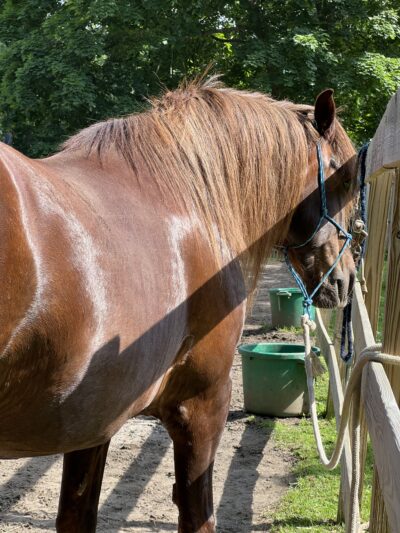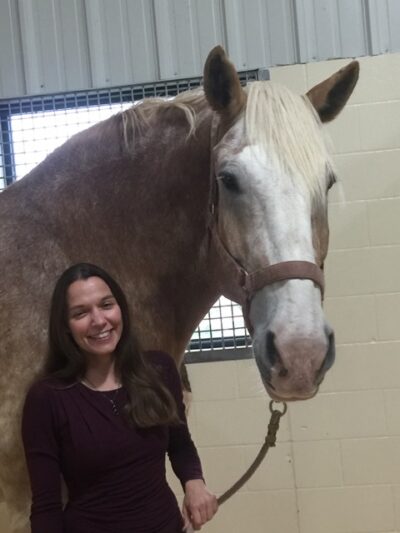single learning post
Genetics of Equine Metabolic Syndrome and Laminitis Risk
Equine metabolic syndrome (EMS) is a metabolic derangement in horses defined by increased insulin resistance. Dr. Norton’s research is using genome-wide association studies and next-generation sequencing technologies to look at associations between known EMS phenotypes, metabolic derangements, and breed susceptibility to identify genes and putative functional alleles associated with EMS and laminitis risk, using Welsh Ponies and Morgans as a model population.

 Dr. Elaine Norton is an assistant professor in the Animal and Comparative Biomedical Sciences and the College of Veterinary Medicine at the University of Arizona. The overall goal of her research is to expand the understanding of the pathophysiology of EMS and allow for early detection of high-risk individuals prior to onset of clinical disease. She is currently exploring the interactions between EMS genetic risk factors and the environment. Elaine obtained her Doctor of Veterinary Medicine from Colorado State University in 2009, her Master of Science in 2013 from Auburn University, her PhD in 2019 from the University of Minnesota, and became a diplomate of the American College of Veterinary Internal Medicine in 2014.
Dr. Elaine Norton is an assistant professor in the Animal and Comparative Biomedical Sciences and the College of Veterinary Medicine at the University of Arizona. The overall goal of her research is to expand the understanding of the pathophysiology of EMS and allow for early detection of high-risk individuals prior to onset of clinical disease. She is currently exploring the interactions between EMS genetic risk factors and the environment. Elaine obtained her Doctor of Veterinary Medicine from Colorado State University in 2009, her Master of Science in 2013 from Auburn University, her PhD in 2019 from the University of Minnesota, and became a diplomate of the American College of Veterinary Internal Medicine in 2014.
With Dr. Elaine Norton
When
Cost $35, $55 non-member
Credits 1
/ Status Currently unscheduled.
All clinics
- WTF – What the founder? Part 1
- Anatomy, Trimming and Hoof Protection – Colorado
- WTF – What the founder? Part 2
- Recognizing and Understanding the Role of Pain in Structural and Functional Asymmetries
- Hands-on Reading Radiographs for the Hoof Care Practitioner
- The Smart Way to Feed Horses – Part 1
- The Smart Way to Feed Horses – Part 2
- Reading Radiographs for the Hoof Care Practitioner
- Documenting Hoof Rehabilitation
- Anatomy, Trimming and Hoof Protection – New York
- Sustaining Your Hoof Care Business
- Advanced Anatomy and Radiographs – Colorado
- Anatomy, Trimming and Hoof Protection – California
- Off to a Good Start: Trimming Foals
- Anatomy, Trimming and Hoof Protection – Tennessee
- Advanced Anatomy and Radiographs – Tennessee
- Trimming Donkeys: Trimming Protocol, Hoof Distortion, and Laminitis
- Feeding Performance Horses
- Anatomy, Trimming and Hoof Protection – Florida
- Anatomy, Trimming and Hoof Protection – Quebec
- Advanced Anatomy and Radiographs – Quebec
- Feeding Pregnant and Growing Horses
- Feeding for Special Needs
- Hyperinsulinemia, Laminitis, and PPID: Diagnosis and Management
- How to Create and Manage Your Track System
- Limb Conformation, Body Posture and Hoof Capsule Distortions
- Collaboration Between Hoof Care Professionals & Equine Bodyworkers
- Dr. Bowker on Sound versus Healthy Hooves
- Changes in Coffin Bone Structure and Influence of Trimming
- Wear Patterns, What They Really Mean!
- Starting Your Hoof Care Business
- Dr. Tomas Teskey on the Equine Dental-Body Connection
- Choosing and Fitting Hoof Boots
- EMS (IR) and PPID: Diagnosis and Management
- Paige Poss Explores Hoof Distortions and Hoof Related Pain
- Utilizing Hoof Imaging in your Trimming Decisions
- Equine Biosecurity; It’s All About Prevention
- Basics of Reading Radiographs
- NRC Plus
- Cushing’s and Insulin Resistance
All of our educational offerings are open to the public.

